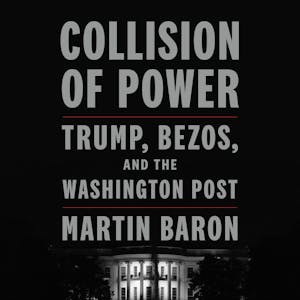Book details

Collision of Power
Trump, Bezos, and THE WASHINGTON POST
Author: Martin Baron; read by Liev Schreiber



Collision of Power
$32.99
About This Book
Book Details
This program features a prologue and epilogue read by the author.
A monumental work of nonfiction that gives a first-row seat to the epic power struggle between politics, money, media, and tech—for fans of Maggie Haberman's Confidence Man and Jane Mayer's Dark Money.
Marty Baron took charge of The Washington Post newsroom in 2013, after nearly a dozen years leading The Boston Globe. Just seven months into his new job, Baron received explosive news: Jeff Bezos, the founder of Amazon, would buy the Post, marking a sudden end to control by the venerated family that had presided over the paper for 80 years. Just over two years later, Donald Trump won the presidency.
Now, the capital’s newspaper, owned by one of the world’s richest men, was tasked with reporting on a president who had campaigned against the press as the “lowest form of humanity.” Pressures on Baron and his colleagues were immense and unrelenting, having to meet the demands of their new owner while contending with a president who waged a war of unprecedented vitriol and vengeance against the media.
In the face of Trump’s unceasing attacks, Baron steadfastly managed the Post’s newsroom. Their groundbreaking and award-winning coverage included stories about Trump’s purported charitable giving, misconduct by the Secret Service, and Roy Moore’s troubling sexual history. At the same time, Baron managed a restive staff during a period of rapidly changing societal dynamics around gender and race.
In Collision of Power, Baron recounts this with the tenacity of a reporter and the sure hand of an experienced editor. The result is elegant and revelatory—an urgent exploration of the nature of power in the 21st century.
A Macmillan Audio production from Flatiron Books.
Imprint Publisher
Macmillan Audio
ISBN
9781250902238
In The News
Praise for Collision of Power:
“Few editors in American history have been as influential as Marty Baron, and so when he has thoughts to share, the rest of us should listen. This is an illuminating and important book about journalism and democracy.” —Jon Meacham
"Engrossing. . . . Candid. . . . Baron chronicles nearly a decade of history marked by sensitive, controversial stories. . . . Impassioned." —Kirkus
Praise for Martin Baron:
“One of the greatest newspaper editors of his or any other era.” —Esquire
“A newsroom giant who led The Washington Post, The Boston Globe, and the Miami Herald to numerous Pulitzer Prizes in a career noted for groundbreaking reports.” —The New York Times
“One of the leading newspaper editors of our time.” —CBS Sunday Morning


